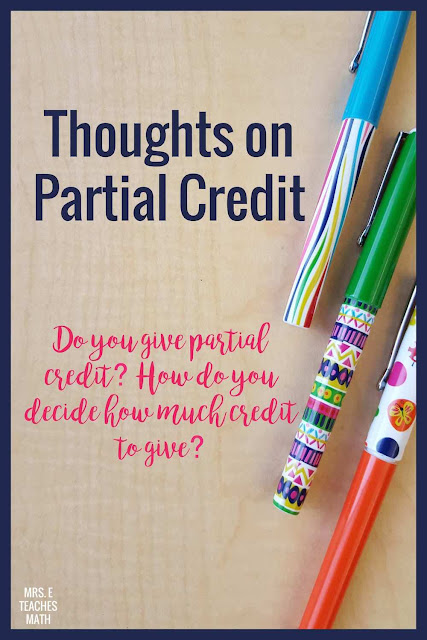I’ve been thinking about partial credit a lot this year. I want grades to accurately describe my student’s level of knowledge, but I also don’t want them to feel discouraged. Remember, I only have honors students. All of my students would make an A in an on-level course, no problem. My goal is to challenge them, without making them want to drop the course in order to get the “easy A”.
Side Note: At my school students can choose to move from an Honors/AP course into an on-level course at any point during the school year. We are on a 5.0 scale and they get to bring their GPA points with them. For my less motivated Honors students, it can be a challenge to keep them in Honors, where they need to be.
Reasons I Like Partial Credit:
• It keeps my students from getting too discouraged (especially my freshmen!). My tests can be difficult.
• It helps me differentiate from students that understand the concept, but make computation errors vs. students that have no idea what they’re doing. Computation errors are very different mistakes than, say, forgetting exponent properties. Those types of errors should be treated differently.
• It encourages my students to show their work neatly. My freshmen really struggle with this. So many of them struggle with writing down their work, even though they are honors-level students.
Reasons I Don’t Like Partial Credit:
• Getting an answer is just as important as the process. Our AP Calculus teacher uses the following example: If you were going in for open heart surgery, would you want your surgeon to get 90% of your surgery right? He got most of it, he just made a few “little” mistakes. While I understand that high school isn’t “the real world”, I totally understand this example. We need to stress the importance of the correct process AND the correct answer.
• Grading takes much longer.
• It can give students (and parents, and future teachers) a false representation of their skills. Students in my course should make an A because they understand the concepts and can solve problems. Students should not make an A because they can get 90% of any problem correct.
My Current Solution:
Currently, I give partial credit on tests and quizzes. However, I make the key and decide how partial credit will be awarded before I give the students the assessment. There are usually questions on every test or quiz that do not receive partial credit. When I’m grading, I grade one page of each test at a time. That way, I’m concentrating on grading one or two problems at a time. I grade all tests without looking at the student’s name. I feel this is the only way I can be fair. This is working for me, but I wonder if there is a better way. I know some people have moved to SBG (standards based grading), and this could be the answer for me, eventually. However, I'm just not there yet.
What Would You Do?
Keep in mind, these are all Honors-level students. Would your answers be different if this were an on-level or remedial class?
This student has the right idea, but doesn’t remember the correct vocabulary. Would you give partial credit for “having the right idea”? Would you give no credit? Would you give full credit and write a comment?
This student understands the concept and has the correct answer. However, they did not use the correct notation. Do they get full credit? Would you take off points for incorrect notation? Would you only write a note?
This student uses the correct vocabulary, but also includes something that’s not quite right. Would you take off points? Would you give full credit and write a comment?




